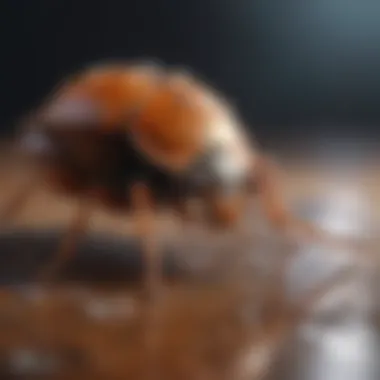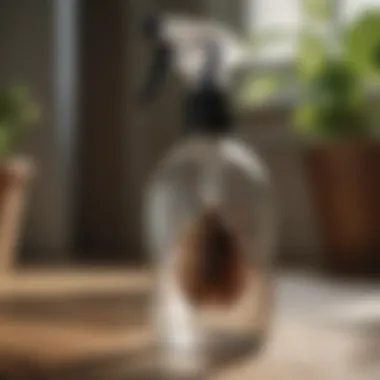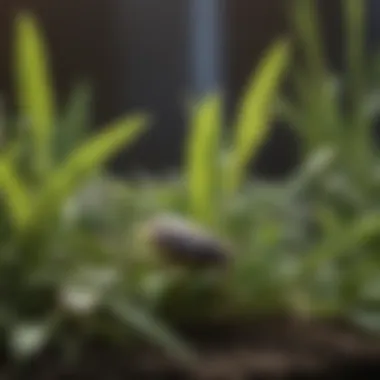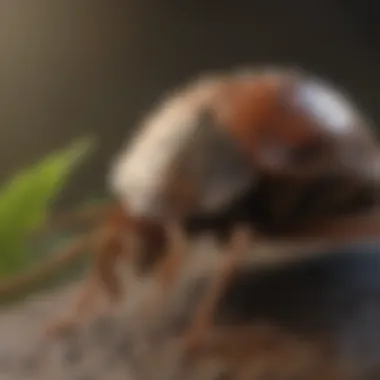Discover Natural Ways to Deter Stink Bugs Safely and Effectively


Preventive Pest Control Strategies
House Exterior Protection
When it comes to preventing stink bugs and other pests from invading your home, focusing on house exterior protection is vital. Begin by inspecting your property for any cracks or openings that pests could use to gain access. Seal these entry points using silicone caulk or weatherstripping to create a barrier against unwanted intruders. Additionally, keeping the area around your house clear of debris such as leaves and clutter can help eliminate hiding spots for pests. By taking these simple steps, you can fortify your home against stink bugs.
Yard Maintenance
Maintaining a well-kept yard is key to warding off stink bugs and other nuisance pests. Regularly mowing your lawn, trimming bushes, and removing standing water can significantly reduce the attractiveness of your yard to these bugs. Consider implementing natural pest control techniques such as planting pest-repelling plants like marigolds or lavender to create a pest-resistant environment. These measures will not only enhance the appearance of your yard but also serve as a deterrent to stink bugs looking for a new home.
Indoor Cleanliness
Creating a clean indoor environment is essential for reducing the risk of stink bug infestations. Implement expert cleaning tips such as vacuuming regularly, sealing food containers, and decluttering areas where pests may hide. By maintaining a pest-resistant indoor space, you can make your home less appealing to stink bugs and other unwanted visitors. Remember, a clean home is a pest-free home.
Garbage Disposal
Efficient waste disposal practices are crucial in controlling stink bug populations. Ensure that garbage cans are sealed tightly to prevent pests from accessing food sources. Properly disposing of organic waste and using sealed compost bins can also help deter stink bugs from congregating near your home. By adopting proper garbage disposal methods, you can significantly reduce the presence of stink bugs and maintain a pest-free environment.
Other Pest Prevention Strategie
Aside from the aforementioned preventive measures, there are innovative ways to safeguard your home from various pests. This may include installing insect screens on windows and doors, using ultrasonic pest repellents, or implementing natural pest barriers such as diatomaceous earth. These additional strategies can complement traditional pest control methods and enhance your overall pest prevention efforts.
Introduction
Understanding Stink Bugs
Stink bugs, scientifically classified as Pentatomidae, are characterized by their distinct shield shape and foul odor when threatened or crushed. These pests feed on a variety of plants, ranging from fruits and vegetables to ornamental flowers. Understanding their behavior patterns and preferences is key to implementing successful repellent measures.
With a penchant for congregating in warm, sheltered areas, stink bugs often seek refuge indoors as temperatures drop, making them a common household pest during colder months. Their resilience and tendency to reproduce rapidly underscore the importance of adopting proactive approaches to stave off infestations.


The Need for Natural Solutions
In light of growing concerns surrounding the use of synthetic pesticides and their potential adverse effects on health and the ecosystem, there is a compelling need for natural solutions to combat stink bugs. Natural repellents not only offer a safer alternative for households with children and pets but also promote environmental sustainability.
By opting for natural remedies, individuals can mitigate the risks associated with chemical exposure while effectively repelling stink bugs from their living spaces. Embracing eco-friendly practices aligns with a burgeoning trend towards holistic pest management, emphasizing the harmony between human habitation and nature's delicate balance.
Essential Oils
In the realm of natural pest control, essential oils stand out as potent agents for repelling stink bugs. Their effectiveness lies in their strong scents that these pests find unbearable. Essential oils offer a safe and eco-friendly alternative to chemical pesticides, making them ideal for those seeking a non-toxic solution to stink bug infestations. When considering the use of essential oils, it is crucial to choose high-quality, pure oils free from synthetic additives or dilutions to maximize their repellent effects.
Lavender Oil
Lavender oil, known for its calming aroma, also serves as a powerful stink bug repellent. Its sweet floral scent masks the odors that attract stink bugs, deterring them from invading your space. To create a lavender oil repellent spray, mix a few drops of lavender oil with water in a spray bottle and apply it around entry points and susceptible areas. Not only will your home smell delightful, but it will also discourage stink bugs from making themselves at home.
Peppermint Oil
Peppermint oil boasts a refreshing, minty aroma that humans love but stink bugs detest. Its strong scent confuses and repels these pests, preventing them from infesting your surroundings. Consider mixing peppermint oil with water and a mild detergent to create a potent stink bug deterrent spray. Regular application of this mixture on windowsills, doorways, and crevices can help ward off stink bugs effectively.
Eucalyptus Oil
Eucalyptus oil, derived from the eucalyptus tree, offers another natural solution to stink bug problems. Its camphorous scent acts as a formidable barrier against these insects, disrupting their pheromone trails and driving them away. Dilute eucalyptus oil in water and spray it in areas prone to stink bug activity to prevent infestations. This aromatic oil not only serves as a repellent but also enhances air quality and adds a fresh ambiance to your living spaces.
Herbal Sprays
In the realm of natural pest control, herbal sprays play a pivotal role in effectively repelling stink bugs without resorting to harmful chemicals. Herbal sprays are crafted from plant essences that possess properties deterring stink bugs from invading your living space or garden. The beauty of herbal sprays lies in their eco-friendly nature, ensuring that you can combat stink bugs while keeping the environment safe. By harnessing the power of plants' natural defenses, herbal sprays serve as a potent deterrent against these pesky invaders.
Neem Oil Spray
Neem oil is a potent organic insecticide that can be harnessed to create a powerful stink bug repellent spray. Derived from the neem tree, neem oil is renowned for its insecticidal properties, making it ideal for combating stink bugs naturally. When formulated into a spray, neem oil targets stink bugs effectively, disrupting their feeding habits and reproductive cycle. Moreover, neem oil is safe for use around children and pets, ensuring a non-toxic solution to stink bug infestations. Embrace the power of neem oil spray to protect your home and garden from stink bug invasions.


Garlic and Pepper Spray
A homemade garlic and pepper spray presents another potent solution for repelling stink bugs naturally. This aromatic concoction acts as a powerful deterrent, deterring stink bugs with its pungent odor and taste. Garlic and pepper contain compounds that stink bugs find repulsive, driving them away from your plants and living spaces. By concocting your own garlic and pepper spray, you empower yourself with a natural, cost-effective barrier against stink bug infestations. Say goodbye to chemical-laden sprays and embrace the natural potency of garlic and pepper to keep stink bugs at bay.
Citrus Oil Spray
Citrus oil spray offers a refreshing and effective method to repel stink bugs naturally. Citrus fruits, like lemons and oranges, contain compounds that stink bugs detest, making them an excellent choice for crafting a bug-repelling spray. The invigorating scent of citrus not only keeps stink bugs at bay but also adds a pleasant fragrance to your surroundings. By utilizing citrus oil spray, you not only protect your plants and home from stink bug infestations but also introduce a fresh and uplifting aroma to your environment. Embrace the power of citrus oils to create a natural barrier against stink bugs and enjoy the benefits of a bug-free space imbued with a delightful citrus scent.
Home Remedies
When it comes to combating stink bugs naturally, home remedies play a crucial role in effectively repelling these pests without resorting to harmful chemicals. Home remedies offer a safer and eco-friendly alternative to control stink bug infestations in your living spaces and gardens. By using common household items and natural ingredients, you can create powerful solutions that are gentle on the environment and safe for your family and pets.
Vinegar Solution
One popular home remedy for stink bug control is the vinegar solution. Vinegar, especially apple cider vinegar, is known for its strong scent that repels stink bugs. To prepare this solution, mix equal parts of water and vinegar in a spray bottle. Shake well to ensure thorough mixing. Spray this solution in areas where stink bugs are present or likely to enter, such as windowsills, doorways, and cracks. The potent odor of vinegar acts as a deterrent, steering stink bugs away from your home.
Diatomaceous Earth
Diatomaceous earth is a natural substance that can effectively deter stink bugs. Composed of fossilized remains of diatoms, this powder-like substance damages the exoskeleton of stink bugs, ultimately leading to dehydration and death. To use diatomaceous earth, sprinkle a thin layer around the perimeter of your home, focusing on entry points and affected areas. The sharp particles present in diatomaceous earth create a barrier that stink bugs avoid crossing. Regular reapplication may be necessary, especially after rain or heavy wind.
Onion and Water Mix
Another simple yet effective home remedy for stink bug repellent is the onion and water mix. Onions possess a pungent smell that repels stink bugs. To prepare this mixture, chop a few onions and soak them in water for a few hours or overnight. Strain the liquid and transfer it into a spray bottle. Apply this solution around entry points, baseboards, and other stink bug-prone areas. The strong odor of onions acts as a natural barrier, deterring stink bugs from invading your living spaces. Regular use of this onion and water mix can help maintain a stink bug-free environment.
Plant-Based Solutions
In the realm of stink bug repelling methods, plant-based solutions stand out as a holistic and environmentally friendly approach. The utilization of plants not only deters stink bugs but also contributes to a healthier ecosystem by avoiding the use of harmful chemicals. Incorporating plant-based solutions into your pest control strategy can have long-lasting benefits for both your home and the surrounding environment.
Mint Plants


Mint plants are renowned for their powerful scent, particularly offensive to stink bugs. By strategically planting mint in your garden or near entry points to your home, you create a natural barrier that stink bugs find repugnant. These plants not only serve as a deterrent but also add a pleasant aroma to your surroundings. Mint plants are relatively easy to maintain and can thrive in various conditions, making them a versatile and effective plant-based solution for repelling stink bugs.
Marigold Plants
Marigold plants possess natural pest-repelling properties, making them a valuable addition to your stink bug defense plan. The strong fragrance of marigolds acts as a natural insect repellent, deterring stink bugs and other pests from infesting your home and garden. Additionally, marigolds are aesthetically pleasing and can enhance the visual appeal of your outdoor space while serving a practical purpose. By planting marigolds strategically around your property, you not only beautify your surroundings but also create a protective barrier against stink bugs.
Chrysanthemum Flowers
Chrysanthemum flowers contain pyrethrin, a natural insect repellent commonly used in organic pest control products. The presence of pyrethrin in chrysanthemums makes them a potent deterrent for stink bugs and other nuisance insects. By planting chrysanthemum flowers in your garden or near entry points to your home, you can effectively ward off stink bugs while enjoying the vibrant blooms of these versatile plants. Chrysanthemums not only serve a practical purpose in pest control but also add beauty and color to your outdoor spaces, creating a harmonious blend of functionality and aesthetics.
Preventive Measures
Preventive measures are crucial in the battle against stink bugs, as they help create a barrier to keep these pests at bay. By implementing proactive strategies, you can significantly reduce the likelihood of stink bugs infiltrating your living spaces. Investing time in preventive measures not only saves you from dealing with infestations but also promotes a healthier environment for you and your family. This section will delve into three key components of preventive measures: sealing entry points, maintaining cleanliness, and using traps.
Sealing Entry Points
Sealing entry points is a fundamental step in pest control, especially when dealing with stink bugs. These sneaky insects can enter your home through tiny gaps and cracks in windows, doors, vents, and utility penetrations. By sealing off these entry points using caulking or weather stripping, you can effectively block stink bugs from entering your home. Inspect and seal any potential entry points both indoors and outdoors to create a formidable barrier against these pests.
Maintaining Cleanliness
Maintaining cleanliness in and around your home is another essential aspect of stink bug prevention. Stink bugs are attracted to decaying organic matter, so it's vital to keep your surroundings clean and clutter-free. Regularly dispose of compost, leaf litter, and other organic debris in sealed containers to deter stink bugs from congregating near your property. Additionally, ensure proper waste management practices and keep indoor areas free of food spills and crumbs to eliminate potential food sources for stink bugs.
Using Traps
Incorporating traps into your stink bug prevention strategy can help reduce stink bug populations around your home. Various types of traps, such as light traps and pheromone traps, can attract and capture stink bugs effectively. Placing traps near entry points or areas where stink bugs are prevalent can intercept and prevent these insects from settling in your living spaces. Remember to regularly check and empty the traps to maintain their efficacy in trapping stink bugs.
Conclusion
Stink bugs can be a persistent nuisance in homes and gardens, causing damage to plants and crops. Therefore, finding effective ways to repel them naturally is crucial. In this article, we have explored a range of methods to keep stink bugs at bay without resorting to harmful chemicals, ensuring a safer environment for both humans and the ecosystem. By implementing the strategies outlined in this guide, you can achieve a pest-free space while promoting a greener and more sustainable approach to pest control.
Effective Stink Bug Repellents
When it comes to repelling stink bugs effectively, essential oils such as lavender, peppermint, and eucalyptus have shown remarkable success. These oils not only deter stink bugs but also infuse a pleasant aroma in your surroundings. Additionally, herbal sprays like neem oil spray, garlic and pepper spray, and citrus oil spray act as natural barriers, deterring stink bugs from invading your space. By incorporating these repellents into your pest control routine, you can create an inhospitable environment for stink bugs, preventing infestations.
Sustainable Pest Control
Opting for sustainable pest control methods is not only beneficial for the environment but also for your overall well-being. By using natural repellents and homemade sprays, you can effectively manage stink bug populations without causing harm to beneficial insects or disrupting the ecosystem. Sustainable pest control minimizes the reliance on chemical pesticides, reducing exposure to toxic substances and promoting a healthier living environment. Embracing sustainable practices in pest management contributes to biodiversity conservation and fosters a harmonious coexistence between humans and nature.



